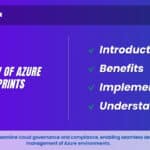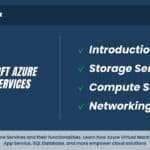Amazon Virtual Private Cloud (VPC): Enhancing Network Security and Flexibility in the Cloud
Introduction:
In today’s cloud-centric world, organizations require robust network infrastructure that ensures security, isolation, and flexibility. Amazon Virtual Private Cloud (VPC) is a key AWS (Amazon Web Services) that offers services that organizations to create a virtual network environment within the AWS cloud. In this article, we’ll look into the idea of Amazon VPC, its importance in cloud computing, and how it helps organizations enhance their network security and flexibility. We will delve into the core features, benefits, and practical use cases of Amazon VPC to understand its role in empowering organizations to build secure and scalable cloud architectures.
Understanding Amazon VPC:
a. Introduction to Amazon VPC: Amazon VPC is a logically isolated network space within the AWS cloud where organizations can provision and manage their AWS resources. It allows complete control over IP addressing, subnets, route tables, and network gateways, enabling organizations to design and configure their network infrastructure as per their requirements.
b. Key Components of Amazon VPC: Amazon VPC consists of various components, including subnets, route tables, security groups, network access control lists (ACLs), internet gateways, and virtual private gateways. These components work together to define the network layout, security policies, and connectivity options within the VPC.
Key Features and Benefits of Amazon VPC:
a. Network Isolation and Security: Amazon VPC provides a secure and isolated network environment for organizations. It allows them to create private subnets, control employing security groups, incoming and outgoing traffic ACLs, and establish VPN connections for secure connectivity to on-premises infrastructure. This isolation enhances network security and protects sensitive data.
b. Customizable IP Addressing: With Amazon VPC, organizations have granular control over IP address ranges, subnets, and network segmentation. They can define their IP address ranges, allocate subnets within the VPC, and assign IP addresses to instances as per their network design. This flexibility enables seamless integration with existing network architectures.
c. Connectivity Options: Amazon VPC offers various connectivity options to ensure seamless integration and hybrid cloud deployments. Organizations can establish site-to-site VPN connections or leverage AWS Direct Connect to establish private network connections between their on-premises infrastructure and the VPC. This allows for secure data exchange and integration between environments.
d. Scalability and Elasticity: Amazon VPC enables organizations to scale their network infrastructure as their needs evolve. They can easily add or remove subnets, adjust IP addressing, and expand the VPC to accommodate growing resource demands. This scalability ensures high availability and performance for applications and services running in the VPC.
Real-World Use Cases of Amazon VPC:
a. Multi-Tier Application Architectures: Amazon VPC is commonly used to deploy multi-tier applications with separate layers for web servers, application servers, and databases. Organizations can define subnets and configure routing to ensure secure communication between the layers while maintaining network segmentation and isolation.
b. Hybrid Cloud Deployments: Amazon VPC facilitates hybrid cloud deployments by enabling secure connectivity between on-premises infrastructure and resources within the VPC. Organizations can extend their existing network infrastructure to the cloud and seamlessly integrate applications and services across environments.
c. Compliance and Security: Amazon VPC provides a secure environment for running workloads that require compliance with industry regulations. By isolating resources within private subnets, enforcing security groups and ACLs, and leveraging encryption capabilities, organizations can meet compliance requirements and protect sensitive data.
d. Disaster Recovery and Business Continuity: Amazon VPC plays a crucial role in disaster recovery and business continuity strategies. Organizations can replicate their resources across multiple Availability Zones within the VPC, ensuring high availability and data redundancy. In the event of a failure, resources can be quickly restored, and applications can continue running with minimal downtime.
Conclusion:
Amazon Virtual Private Cloud (VPC) is a fundamental service offered by AWS that empowers organizations to design and manage their network infrastructure in the cloud. With features such as network isolation, customizable IP addressing, connectivity options, scalability, and enhanced security, Amazon VPC provides a flexible and secure foundation for building cloud architectures. By leveraging Amazon VPC, organizations can achieve better control over their network resources, ensure compliance, facilitate hybrid cloud deployments, and establish robust disaster recovery strategies. As cloud computing continues to evolve, Amazon VPC remains a critical component for organizations seeking to maximize the benefits of the AWS cloud while maintaining control and security over their network environments.













